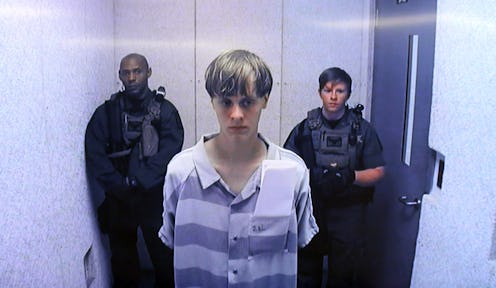News
Sociopaths Vs. Psychopaths: What's The Difference?
On the evening of June 17, 21-year-old Dylann Roof allegedly spent about an hour among an Emanuel African Methodist Episcopal Church congregation before reportedly taking out a gun and firing at the church's black members. Within days of the shooting, accounts of Roof's chillingly introverted manner as well as disturbing rants that may have been tied to him, his criminal history, and photos began to surface. The words "sociopath" and "psychopath," often used interchangeably, were quickly thrown into the mix by a number of outlets such as the Huffington Post, which wondered whether those terms were applicable to the suspected gunman. However, there is a big difference between sociopaths and psychopaths, and it's important to distinguish between the two.
Sociopathy and psychopathy are both considered Antisocial Personality Disorders (ASPD), according to the Diagnostic and Statistical Manual of Mental Disorders (DSM-5), a guide for psychological diagnoses formally released by the American Psychiatric Association. According to the DSM-5, both sociopaths and psychopaths disregard laws, social morality, and the rights of others, and they fail to feel remorse or guilt for their behavior. Both sociopaths and psychopaths have violent tendencies. However, beyond these shared traits, sociopaths and psychopaths actually differ substantially.
Sociopaths are agitated and disorganized individuals who are unable to blend in with society, according to an essay for Psychology Today by Scott A. Bonn. Though they are capable of forming relationships with individuals or within a small group, they remain ultimately disconnected from society. Sociopaths are unable to even imitate the expressions and feelings of ordinary people, making them easier to identify. The inability of sociopaths to hold back angry outbursts and lead organized and responsible lives has rendered many uneducated, unemployed, or even homeless, Bonn wrote. It's easier to distinguish crimes committed by a sociopath as they are often impulsive, ill-planned, and spontaneous.
Psychopaths maintain the same disturbing disregard for society, morality, and people that sociopaths do. However, according to the DSM-5, they are high-functioning and completely able to conceal these attitudes beneath a facade of charm and empathy. Where sociopaths are often unable to complete formal educations, psychopaths are usually highly organized and intelligent. Psychopaths use their intelligence to manipulate unsuspecting people by imitating ordinary social behaviors and expressions to gain others' trust. Unlike sociopaths, they are incapable of genuinely connecting with people. Psychopaths are rarely identified as they can easily blend in and form relationships. Crimes committed by psychopaths are well thought out and carefully executed, allowing them to sometimes evade being caught and punished.
So, would we identify mass killers as sociopaths or psychopaths? In the case of Roof, it's important to note that a trained psychiatrist has yet to formally diagnose the suspected Charleston shooter, but details about his life, mannerisms, and most telling of all, the circumstances of his crime, indicate that he may have reflected sociopathic tendencies. Love Fraud's Donna Anderson, a freelance writer who has written books about sociopathy, wrote that although Roof is "totally responsible for his horrific behavior," and there's a "good chance that Dylann's primary issue is sociopathy." Former peers who attended high school with the Charleston shooter told the Associated Press about Roof's introverted behaviors as a youth; few, but some have come out as old friends of him. These relationships do not reflect deceit on Roof's part, as he actually opened up about his passionate hatred for African Americans with at least one of them, the Associated Press reported. So, although Roof was clearly emotionally distant and probably lacked social skills, he was able to form a few relationships.
Family friends have told the AP about Roof's obsessive-compulsive tendencies growing up, although as a youth, the Charleston shooter still led a relatively normal life, interacting with other children and attending church. However, family friends allege Roof's father was verbally abusive and was often at odds with his mother as their family struggled to make ends meet. His parents divorced in 2009, and in 2010, Roof dropped out of school after failing the ninth grade twice, which could reflect the common struggle of a sociopath to obtain an education. Those who knew him at the time claimed his behavior became troubling after he dropped out of school. Roof was unable to hide his disregard for law and society; he aroused the suspicions of shopkeepers by unwittingly asking suspicious questions about closing times and went on to be arrested for drug possession. Roof also allegedly posted an abundance of racially charged, white supremacist ramblings online under different usernames and websites, the Associated Press reported.
At the crime scene, Roof allegedly only intended to kill the church's pastor and reportedly attempted to kill himself, only to realize he had run out of bullets, a survivor of the shooting alleged. Days before the shooting, the AP reported that Roof RSVP'd to attend his sister's wedding, which could have indicated he may not have even intended to carry out the shooting.
Sociopaths and psychopaths share plenty of traits, and ultimately maintain the same mindsets regarding law and society. The only difference lies in their execution; it's rare you'll be able to identify a psychopath when you interact with one, as they are capable of entirely concealing their true motives. Sociopaths, on the other hand, cannot.
Images: Getty Images (3)
